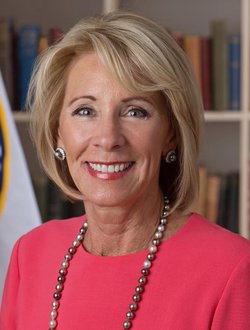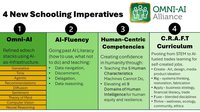The following are prepared remarks delivered by Secretary DeVos to the House Appropriations Subcommittee on Labor, Health and Human Services, Education, and related agencies on March 26, 2019
Chairwoman DeLauro, Ranking Member Cole, and Members of the Subcommittee:
Thank you for the opportunity to testify on the President’s fiscal year 2020 budget.
I thought it would be useful to begin by recalling Congress’s commitment when it created the U.S. Department of Education 40 years ago. Then, Congress vowed that the move would “not increase the authority of the Federal Government over education or diminish the responsibility for education which is reserved to the States,” and, I’ll add, communities and parents. This budget reflects a commitment to that sentiment.
It also recognizes who actually funds the government’s budget: American taxpayers. And so, we propose Congress spend their money wisely, efficiently, and with restraint. The President’s fiscal year 2020 budget would reduce overall funding for Department programs by $7.1 billion, which is a 10 percent decrease from 2019’s appropriated level.
This reduction is similar to last year’s request, and the year before that, as well. I acknowledge that you rejected those recommendations. I also acknowledge that it’s easier to keep spending, to keep saying “yes,” and to keep saddling tomorrow’s generations with today’s growing debt. But, as it’s been said, the government will “run out of other people’s money.”
Over the past 40 years, federal taxpayer spending on education has increased about 180 percent, amounting to over $1.2 trillion cumulatively. And yet, we’re still 24th in reading, 25th in science, and 40th in math when compared to the rest of the world. Doing the same thing—and more of it—won’t bring about new results.
I propose a different approach: freedom.
This budget focuses on freedom for teachers. Freedom for parents. And freedom for all students.
A great education shouldn’t be determined by where you live nor by who you know. And it shouldn’t be determined by family income. And education shouldn’t be an old-school, industrial-age, one-size-fits-all approach.
Every student is unique and every one learns differently. Every child should be free to learn where and how it works for them—where and how it unlocks their potential.
That’s why the President’s 2020 budget proposes a historic investment in America’s students: Education Freedom Scholarships.
Our bold proposal will offer a dollar-for-dollar federal income tax credit for voluntary contributions to 501(c)(3), non-profit organizations that provide scholarships to school students, not school buildings.
These students, their families, teachers, schools, states—all can choose to participate in the program. Or they can elect not to participate. It’s a “choice.”
And since the proposal relies entirely on voluntary contributions to non-profit organizations, it won’t take a single dollar from local public school teachers or public school students. Indeed, our budget maintains current levels of funding for Title I and IDEA.
Something else… Education Freedom Scholarships aren’t only for students who want to attend private schools. In fact, some states may choose to design scholarships for public school options, such as apprenticeships or transportation to a different public school. States have the opportunity to be really imaginative and to serve the unique needs of their students.
We don’t have to look far to see that education freedom works. Thanks to a menu of options and the D.C. Opportunity Scholarship program—embraced by teachers, parents, and students alike—more than half of students in the District attend schools other than their assigned one. And there is still significant, unmet demand.
We propose Congress double the D.C. program’s funding to $30 million to meet those students’ needs.
This Administration believes students of all ages should be free to pursue multiple pathways to higher education and successful careers. That’s why this budget proposes to expand the use of Pell Grants for quality, short-term programs. It also invests in career and technical education, and streamlines student loan repayment.
The latter is urgently necessary, because, today Federal Student Aid holds $1.5 trillion in outstanding loans. More than total auto debt and credit card debt. And 43 percent of those student loans are either in default, more than 30-days delinquent, or are negatively amortized. And taxpayers are on the hook for it all.
This budget consolidates numerous repayment plans and raises the cap on a borrower’s monthly payment to 12.5 percent of discretionary income. This is one way the federal government can become a more responsible lender. Policies should not entice students into greater debt nor should they put taxpayer dollars at greater risk.
Education freedom isn’t just for parents and students. Teachers need greater freedom, as well. We seek to empower America’s teachers and elevate their profession via this budget with a new, total investment of $370 million.
I regularly meet with a number of excellent teachers who tell me they’d like to choose their own professional development and customize it for their needs. To that end, the budget requests an increase of $170 million to focus on development that is controlled by teachers, not dictated by the district office. These “teacher vouchers” treat teachers as the professionals they are.
Teachers also tell me about the value of mentors or residency opportunities. So, we’re requesting $200 million to enable new teachers more opportunities to learn from the best.
It’s also essential that teachers and students be safe at school.
In the wake of tragic acts of school violence in our country, President Trump asked me to lead a Federal Commission on School Safety. To support the Commission’s recommendations, we request $200 million to help communities develop their own school emergency plans, and to focus on counseling and healthy behaviors for their students.
In the end, budgets are about priorities. Ours are: students, parents, teachers, and taxpayers. If our country is to remain secure, strong, prosperous, and free, we need students of all ages who are prepared to pursue successful careers and lead meaningful lives.
Thank you for this opportunity to testify. I am happy to respond to any questions you may have.











